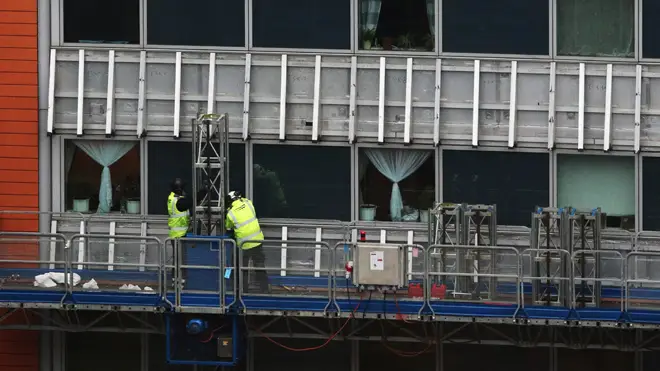
Nick Abbot 10pm - 1am
27 April 2021, 07:49 | Updated: 28 April 2021, 00:48

It could be up to three years before the controversial 'cladding loan scheme' is brought in in England, campaigners have told LBC.
Leasehold campaigners were told early details of the plans in a meeting with Housing Department officials and the Building Safety Minister Lord Greenhalgh, last week.
There are fears the delay could leave many flat-owners at risk of bankruptcy and evictions, with many building owners expected to start remedial work in the coming months, demanding upfront funding from residents to cover bills in the millions of pounds.
READ MORE: More than a quarter of cladding safety certificates 'invalid'
READ MORE: Grenfell Tower: Treatment of residents' concerns ‘a disgrace,' Sadiq Khan tells inquiry
The loan scheme, which will cost billions, is part of the Government's solution to the cladding crisis, exposed by the Grenfell tragedy.
They plan to offer long-term loans against flats in building between 11 and 18 metres tall, capped at £50 a month, to pay to remove dangerous cladding.
But eleven weeks after the controversial plan was announced by the Housing Secretary, no official details have been released.
However, LBC has now learned the Department of Housing plans to include the scheme as part of the already-delayed Building Safety Bill.
Campaigners have warned officials there could be a wave of bankruptcies and evictions if they have to wait that long for support.
Giles Grover, a campaigner from End Our Cladding Scandal, said the delay is already being felt:
"One leaseholder recently got a bill for £78,000 to be paid in the next six months.
"We're also seeing managing agents writing on their letters to leaseholders saying 'you need to pay these bills because the Government hasn't yet come forth with details of the loan scheme.
"So what's really concerning - we asked what the timescales are, and they said the plan is to implement it alongside the Building Safety Bill.
"As we understand it, it's going to be a couple of years before that comes in."
Officials in the meeting allegedly accepted the legislative process 'could take years.'
Industry experts expect the Bill to take at least a year to be fully passed, but it could take up 2-3 years for full implementation.
It was suggested that the government could open applications sooner, or run a pilot scheme to test how the loans would work in practice.
But ultimately, it's thought this huge and complicated new financing system needs legislative backing to work.
The plans are controversial, with many leasehold campaigners furious at the idea they would be expected to pay anything.
They also fear the plans would plunge properties into negative equity, and point out that often cladding isn't the only building safety defect that can cost millions to repair.
But, for many, the loan scheme is better than nothing - and it's all that stands between them and bankruptcy.
The Ministry of Housing, Communities and Local Government said: "These claims are misleading - we're working as quickly as possible to launch the scheme and will publish more details on how it will work in due course."
Shadow Secretary of State for Housing Thangam Debbonairesaid: “Every single day for some people is a day too many - there are people who have already gone bankrupt with the costs associated with the so-called waking watch.
"Whatever legislation it is - if they wanted to take it a piece at a time - I would have done anything to get some of this through so some of the residents could have had some sort of relief from the agony they are in.
"And if they could have got the loan-scheme through sooner, that would have been better than nothing.
"However, I still come back to the fact that it shouldn't be a loan, it doesn't cover all costs, and it's still leaving people in limbo."
Emma Byrne from End Our Cladding Scandal said: "Ministers have repeatedly tried to buy good headlines and MPs’ votes with vague announcements of funding measures that they claim will help innocent and increasingly desperate leaseholders caught up In the building safety crisis.
‘However, everyone knows these hard-fought concessions are woefully inadequate.
"A £5billion cladding pot is a lot of money - until you realise the total cost to fix this crisis will easily cost more than £15billion and Government will use the proposed Developer levy - a pitiful £2billion over ten years - to pay back those funds.
"The Government's unfair forced loans plan will send tens of thousands of people into negative equity and ensure they lose their homes, with the current funding doing nothing to fix the huge range of external and internal building defects created by decades of shoddy construction work.
"Meanwhile thousands of leaseholders are already facing bankruptcy and financial hardship from interim costs and insurance, right now.
"They can’t wait years in the hope of help - some only have months left. We need action from Government to finally match its promises."
It comes as today the Fire Safety Bill, the first part of the Government’s major post-Grenfell legislation, is back in the Commons after being rejected in the House of Lords for the third time.
The bill has been lodged in a ‘ping pong’ between the two Houses, over protections for leaseholders on cladding costs.
A growing number of Tory rebels are breaking with the Government to vote to protect flat-owners from these bills.
It’s a clear sign of how similarly difficult and controversial the Building Safety Bill could be – with no one expecting it to pass quickly.